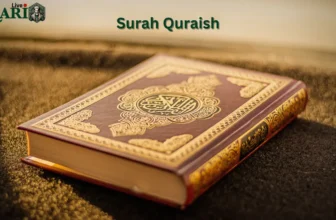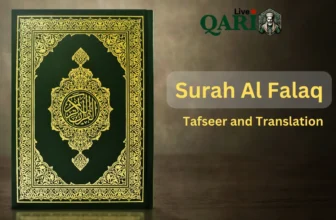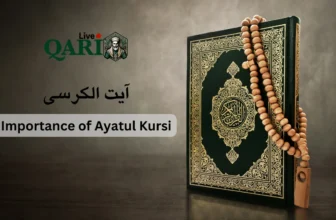
This Surah was revealed after the battle of Bani An-Nadhir. All traditions agree that this battle took place after the incident of Bi’r Ma’unah, and historically it is also well known that the incident of Bi’r Ma’unah occurred after the Battle of Uhud.
The Surah Hashr translation
In Surah Hashr, the chapter highlights the exodus of disbelievers from the People of the Scripture, who were expelled from their homes unexpectedly, demonstrating the power of divine decree. Believers who fear Allah are promised eternal gardens, while disbelievers face the unending torment of Hell, a warning against ingratitude and wrongdoing. The Surah also emphasizes the role of the Prophet Muhammad in guiding and purifying the unlettered, teaching them the Quran and wisdom.
The Benefits Of Reciting Surah al Hashr
Certainly, Surah Hashr is the 59th chapter of the Qur’an and is comprised of 24 verses. Like many other Surahs, reciting Surah Hashr carries with it a set of benefits, both spiritual and worldly, as mentioned in various hadiths and traditions. Spiritual Upliftment: Consistently reciting Surah Hashr contributes to the elevation of one’s spiritual condition, bringing the individual nearer to Allah.

Understanding the Attributes of Allah in surah al hashr
The last three verses of this Surah highlight several of Allah’s names and attributes. Regular recitation and reflection on these verses can help one develop a deeper understanding of Allah’s attributes and increase love and awe for Him.
Protection from Adversities
According to some traditions, reciting Surah Hashr can provide protection from various adversities and hardships. It acts as a shield against troubles and challenges.
- It is believed that those who recite the Qur’an regularly may receive intercession on the Day of Judgment, with the Qur’an acting as their representative and advocate. Surahs like Hashr, when recited with understanding and reflection, can be among those who plead for the reciter’s forgiveness.
- Blessings and Rewards Every letter of the Qur’an that is recited earns the reciter ten rewards. Given the richness and depth of Surah Hashr, its recitation can accrue significant blessings and rewards.
- Expiation of Sins Reciting the Qur’an, including Surah Hashr, with sincerity and repentance can lead to the expiation of sins. The act of turning to Allah’s words and reflecting on them is a form of worship that cleanses the heart.
- Increase in Sustenance According to some traditions, the regular recitation of certain Surahs, including surah Hashr, can lead to an increase in one’s sustenance and provision.
- Protection from Hypocrisy Surah Hashr discusses the characteristics of hypocrites. By understanding and reflecting on these traits, a believer can strive to avoid such behaviors and protect themselves from falling into hypocrisy.
Instilling Awe of Allah The verses of this Surah, particularly those that portray the might and supremacy of Allah, have the potential to inspire a reverent awe of Allah in the heart of the believer, fostering greater awareness of their actions.
Strengthening Faith: The narratives and lessons in Surah Hashr can strengthen a believer’s faith, providing clarity and reinforcement of key Islamic principles.

Surah Hashr Verses 1-2
Whatever is in the heavens and whatever is on the earth glorifies Allah. For He is the Almighty, All-Wise.
Explanation
This verse highlights the universal reality that every creation in the heavens and the Earth, whether animate or inanimate, glorifies and praises Allah. Every aspect of creation, from the planets and stars in the skies to the trees and creatures on Earth, acknowledges Allah’s might and wisdom. The verse serves as a reminder to believers of Allah’s omnipresence and supreme authority in all aspects of existence, highlighting how all of creation inherently acknowledges His greatness.
He is the One Who expelled the disbelievers of the People of the Book from their homes for ˹their˺ first banishment ˹ever˺. You never thought they would go. And they thought their strongholds would put them out of Allah’s reach. But ˹the decree of˺ Allah came upon them from where they never expected. And He cast horror into their hearts so they destroyed their houses with their own hands and the hands of the believers.1 So take a lesson ˹from this˺, O people of insight!
Explanation
This verse tells the story of a historical event in which the Jewish tribe of Banu Nadir was expelled from their residences in Madinah, a decision led by Prophet Muhammad and carried out with the involvement of the Muslim community. The Banu Nadir had broken their treaty with the Muslims and plotted against the Prophet. When confronted, they took refuge in their fortresses, thinking they were safe from any potential harm. However, Allah’s decree is supreme, and their sense of security is shattered. Intense dread gripped their hearts, and in their frenzy, some of them went as far as demolishing their own residences. The Muslims also participated in this destruction as part of the eviction.
The verse ends with a warning to those who can reflect and understand, emphasizing the need for insight and vision. It teaches believers the consequences of breaking treaties and the unexpected ways in which Allah’s decree can manifest.
Surah Hashr Verses 3-5
Had Allah not decreed exile for them, He would have certainly punished them in this world. And in the Hereafter they will suffer the punishment of the Fire.
Explanation
This verse suggests that were it not for Allah’s divine decree, leading to the expulsion of the disbelieving People of the Scripture (in reference to the Banu Nadir) from their residences, they would have undoubtedly encountered a harsh earthly punishment. Moreover, for their disbelief and treachery, they face the looming punishment of the Fire in the Hereafter. This teaches believers about Allah’s mercy, even towards those who oppose the truth; sometimes, they are given a reprieve in this world, though ultimate justice awaits in the afterlife.
This is because they defied Allah and His Messenger. And whoever defies Allah, then Allah is truly severe in punishment.
Explanation
The cause for the punishment and eviction of the Banu Nadir is made evident – it results from their resistance and hostility directed at Allah and His Messenger, Prophet Muhammad (peace be upon him). The verse serves as a stern reminder that opposing the divine guidance from Allah and His chosen messengers brings about severe consequences. Allah’s justice is swift and severe for those who knowingly reject the truth and harm the believers.
Whatever palm trees you ˹believers˺ cut down or left standing intact, it was ˹all˺ by Allah’s Will, so that He might disgrace the rebellious.1
Explanation
This verse indicates that had it not been for Allah’s decree to expel the disbelieving People of the Scripture (referring to the Banu Nadir) from their homes, they would have faced a severe punishment in this worldly life. Moreover, for their disbelief and treachery, they face the looming punishment of the Fire in the Hereafter. This teaches believers about Allah’s mercy, even towards those who oppose the truth; sometimes, they are given a reprieve in this world, though ultimate justice awaits in the afterlife.
Surah Hashr Verses 6-7
As for the gains Allah has turned over to His Messenger from them—you did not ˹even˺ spur on any horse or camel for such gains. But Allah gives authority to His messengers over whoever He wills. For Allah is Most Capable of everything.
Explanation
This verse refers to the goods, lands, and properties of the Banu Nadir that were handed over to the Muslims after their expulsion. The Muslims did not have to engage in heavy combat using horses or camels to acquire these assets. Instead, it was through Allah’s decree that these properties were transferred to the Muslims without intense warfare. The verse underscores that Allah can grant His messengers victory and spoils without them undergoing strenuous efforts. It’s a reminder of Allah’s ultimate power and competence in all matters.
As for gains granted by Allah to His Messenger from the people of ˹other˺ lands, they are for Allah and the Messenger, his close relatives, orphans, the poor, and ˹needy˺ travellers so that wealth may not merely circulate among your rich. Whatever the Messenger gives you, take it. And whatever he forbids you from, leave it. And fear Allah. Surely Allah is severe in punishment.
Explanation
When assets, goods, or land are gained by Muslims in such circumstances, they are not merely for personal gain or for the elite. This verse provides guidelines on the distribution of such spoils. They are to be used for:
Allah: This refers to using a portion of the spoils for religious and community welfare projects.
The Messenger: To support the Prophet’s household and his mission.
Near relatives: Referring to the relatives of the Prophet who were not eligible to receive regular alms (zakat).
Orphans: To support those children who have lost their parents and are in need.
Stranded traveller: To assist travellers who are stranded or in difficulty during their journeys.
The purpose of this divinely mandated distribution is to ensure that wealth does not merely circulate among the rich but benefits various segments of society, especially those in need. This also reinforces the idea that the Prophet’s commands, based on divine guidance, are to be followed. Believers are advised to accept what the Prophet gives and abstain from what he forbids. A warning concludes the verse, reminding believers to fear Allah and be conscious of His severe penalty.
Surah Hashr Verses 8-10
˹Some of the gains will be˺ for poor emigrants who were driven out of their homes and wealth, seeking Allah’s bounty and pleasure, and standing up for Allah and His Messenger. They are the ones true in faith.
Explanation
This verse addresses the early Muslim emigrants, the Muhajirun, who left their homes in Makkah and migrated to Madinah to preserve their faith and support the Prophet Muhammad (peace be upon him). They had to abandon their properties and possessions in the process. These emigrants are described as seeking Allah’s bounty and approval through their sacrifices. Their sincerity and genuine support for Allah’s cause and His Messenger earmark them as truthful ones deserving of respect and honour. This verse indicates that they, too, have a rightful share in the spoils gained.
As for those who had settled in the city and ˹embraced˺ the faith before ˹the arrival of˺ the emigrants, they love whoever immigrates to them, never having a desire in their hearts for whatever ˹of the gains˺ is given to the emigrants. They give ˹the emigrants˺ preference over themselves even though they may be in need. And whoever is saved from the selfishness of their own souls, it is they who are ˹truly˺ successful.
Explanation
The Ansar, the original residents of Madinah who had embraced Islam before the arrival of the emigrants, are praised here. The Ansar welcomed the Muhajirun warmly, displaying selflessness and generosity. They harboured no jealousy or ill feelings towards the emigrants even when they received a share of the spoils. Instead, they prioritized the needs of the emigrants over their own, even if they were in need. Such selflessness is a mark of true faith, and the verse highlights that those who can overcome the greed and selfishness of their souls will indeed be successful.
And those who come after them will pray, “Our Lord! Forgive us and our fellow believers who preceded us in faith, and do not allow bitterness into our hearts towards those who believe. Our Lord! Indeed, You are Ever Gracious, Most Merciful.”
Explanation
This verse refers to the Muslims who came after the initial groups of Muhajirun and Ansar. These later believers make sincere prayers, asking Allah to forgive both them and their earlier counterparts in faith. They also ask Allah to cleanse their hearts of any potential resentment or ill feelings towards fellow believers. Their prayer exemplifies the unity and brotherhood that Islam encourages among its followers, regardless of their background or when they embrace the faith. The verse concludes by acknowledging the kindness and mercy of Allah.
Surah Hashr Verses 11-13
Have you ˹O Prophet˺ not seen the hypocrites who say to their fellow disbelievers from the People of the Book,1 “If you are expelled, we will certainly leave with you, and We will never obey anyone against you. And if you are fought against, we will surely help you.”? But Allah bears witness that they are truly liars.
Explanation
This verse draws attention to the behaviour of the hypocrites. These individuals outwardly professed Islam but harboured disbelief in their hearts. These hypocrites secretly assured their non-Muslim allies, specifically referring to some of the People of the Scripture, that they would support and stand by them if they were expelled or attacked by true Muslims. However, Allah exposes the falsehood of these promises, attesting to their deceit and insincerity. It’s a reminder that while humans may hide their intentions from one another, nothing is hidden from Allah.
Indeed, if they are expelled, the hypocrites will never leave with them. And if they are fought against, the hypocrites will never help them. And even if the hypocrites did so, they would certainly flee, then the disbelievers would be left with no help.
Explanation
Elaborating on the previous verse, this passage highlights that the promises of the hypocrites are empty. Even if the situation arose where their non-Muslim allies were expelled or faced battle, these hypocrites would not stand by their pledges. They would either refrain from supporting their allies or, if they did, they would quickly flee from the battlefield. The verse underscores the unreliability and cowardice of the hypocrites, contrasting starkly with the steadfastness of true believers.
Indeed, there is more fear in their hearts for you ˹believers˺ than for Allah. That is because they are a people who do not comprehend.
Explanation
This verse conveys that the hypocrites and their allies harbour a greater fear of the true believers than they do of Allah. Their priorities are skewed, placing more concern on worldly conflicts and power dynamics than on the reckoning of the Almighty. Their lack of genuine understanding and insight into the deeper realities of faith and the afterlife leads them to fear mortals more than the Creator.
Surah Hashr Verses 14-16
Indeed, there is more fear in their hearts for you ˹believers˺ than for Allah. That is because they are a people who do not comprehend.
Explanation
This verse describes the characteristics of the mentioned hypocrites and their allies. They lack the courage to confront the believers in open battle; they only engage in combat from fortified positions or behind barriers, indicative of their underlying fear and hesitation. Further, while they might outwardly appear united, they have severe internal disputes and disagreements. Their lack of unity stems from their inability to reason and understand the deeper truths, leading to disarray and disunity among themselves.
They are ˹both just˺ like those who recently went down before them:1 they tasted the evil consequences of their doings. And they will suffer a painful punishment.
Explanation
The verse draws a parallel between the present-day hypocrites and those who came before them, perhaps referring to previous communities or nations that opposed the truth. Just as the preceding groups faced the repercussions of their actions, so too will the present-day hypocrites taste the negative outcomes of their choices. This serves as a warning that history often repeats itself, especially when people do not take lessons from the past.
˹They are˺ like Satan when he lures someone to disbelieve. Then after they have done so, he will say ˹on Judgment Day˺, “I have absolutely nothing to do with you. I truly fear Allah—the Lord of all worlds.”1
Explanation
This verse provides a powerful analogy, comparing the hypocrites to Satan’s deceptive ways. Just as Satan lures a person into disbelief and then abandons him, claiming to fear Allah, the hypocrites, too, betray and abandon their allies when things become challenging. This analogy exposes the duplicity and unreliability of both Satan and the hypocrites. Satan’s proclamation of fearing Allah after leading others astray illustrates the ultimate deceit and treachery he embodies, a trait mirrored in the actions of the hypocrites.
Surah Hashr Verses 17-19
So they will both end up in the Fire, staying there forever. That is the reward of the wrongdoers.
Explanation
Building on the previous verses that discussed the actions of the hypocrites and drew an analogy between them and Satan, this verse states the final consequence for both: they will dwell in the Fire eternally. It is a severe punishment reserved for those who knowingly do wrong. The verse serves as a sombre reminder of the ultimate outcome for those who engage in deceit, treachery, and disbelief.
O believers! Be mindful of Allah and let every soul look to what ˹deeds˺ it has sent forth for tomorrow.1 And fear Allah, ˹for˺ certainly Allah is All-Aware of what you do.
Explanation
This verse serves as a directive to the believers. They are reminded to maintain their consciousness and fear of Allah. It emphasizes the importance of self-accountability, urging every individual to introspect and evaluate their deeds, considering what they are preparing for their afterlife (referred to as “tomorrow” symbolically). The reminder that Allah is well aware of all actions emphasizes that nothing escapes His notice, urging believers to be sincere and righteous in their deeds.
And do not be like those who forgot Allah, so He made them forget themselves. It is they who are ˹truly˺ rebellious.
Explanation
This verse warns believers not to be like those who forget or neglect their duty to Allah. Such neglect leads to a spiritual emptiness where individuals lose their sense of self-worth and purpose, represented by the phrase so He made them forget themselves. The state of forgetting oneself symbolizes a deep spiritual loss, leading to heedlessness about the purpose of life and the Hereafter. Those who fall into this state are described as defiantly disobedient, emphasizing the gravity of their deviation.
Surah Hashr Verses 20-21
The residents of the Fire cannot be equal to the residents of Paradise. ˹Only˺ the residents of Paradise will be successful.
Explanation
This verse draws a stark contrast between the inhabitants of the Fire (Hell) and the inhabitants of Paradise (Heaven). It emphasizes the fundamental differences in their respective outcomes based on their beliefs, actions, and choices in worldly life. The “companions of Paradise” are described as the ultimate achievers or the successful ones. This is a clear indication that real success in the sight of Allah is attaining Paradise and escaping the torment of the Fire.
Had We sent down this Quran upon a mountain, you would have certainly seen it humbled and torn apart in awe of Allah. We set forth such comparisons for people, ˹so˺ perhaps they may reflect.1
Explanation
This verse offers a powerful metaphor to illustrate the weightiness and magnitude of the Qur’an’s message. If such a firm and massive creation as a mountain were to receive the Qur’an, it would become utterly humbled, and it might even crumble due to its awe and fear of Allah. This imagery serves to make humans reflect on the profound nature of the Divine Revelation and realize how they should approach the Qur’an with humility, reverence, and contemplation. The examples given in the Qur’an are not mere stories or analogies but are presented with the intent that people might ponder, reflect, and derive lessons from them.
Surah Hashr Verses 22-24
He is Allah—there is no god ˹worthy of worship˺ except Him: Knower of the seen and unseen. He is the Most Compassionate, Most Merciful.
Explanation:
This verse begins by affirming the oneness of Allah, emphasizing that there is no deity worthy of worship other than Him. It describes Allah as the one who knows both the unseen realms and the visible world, a testament to His all-encompassing knowledge. The attributes “Beneficent” (Ar-Rahman) and “Merciful” (Ar-Raheem) are highlighted, emphasizing His boundless compassion and mercy towards His creation.
He is Allah—there is no god except Him: the King, the Most Holy, the All-Perfect, the Source of Serenity, the Watcher ˹of all˺, the Almighty, the Supreme in Might,1 the Majestic. Glorified is Allah far above what they associate with Him ˹in worship˺!
Explanation
This verse further elaborates on Allah’s unique attributes. He is described as:
The Sovereign (Al-Malik): The ultimate ruler and king of all existence.
The Holy One (Al-Quddus): Pure from any imperfection, deficiency, or fault.
The Source of Peace (As-Salam): The one who bestows peace and safety.
The Guardian of Faith (Al-Mu’min): The one who provides security and faith.
The Preserver of Safety (Al-Muhaymin): The protector and overseer of His creation.
The Exalted in Might (Al-Aziz): Mighty, honourable, and undefeatable.
The Compeller (Al-Jabbar): The one who restores, mends, and compels.
The Superior (Al-Mutakabbir): Above all, transcendent and supreme.
The verse concludes by exalting Allah above any false deities or concepts that people may associate with Him, reaffirming His unparalleled and unique status.
He is Allah: the Creator, the Inventor, the Shaper. He ˹alone˺ has the Most Beautiful Names. Whatever is in the heavens and the earth ˹constantly˺ glorifies Him. And He is the Almighty, All-Wise.
Explanation
The surah hashr last 3 verses
The Creator (Al-Khaliq): The one who brings everything into existence from nothing.
The Inventor (Al-Bari): The one who creates with specific purposes and proportions.
The Fashioner (Al-Musawwir): The one who shapes and forms His creation with distinct attributes.
The surah hashr last 3 verses emphasize that the most beautiful names belong to Him alone. Everything in the heavens and the earth is in a state of praising and glorifying Him, a testament to His universal lordship. The verse concludes by highlighting His might and wisdom, attributes that permeate all His actions and decisions
Related Posts
- 4 Qul in Islam: Your Ultimate Key to Protection & Blessings
- Ayatul Kursi: The Powerful Throne Verse
- Your Fortress Against Harm: Ayatul Kursi and 3 Quls
Frequently Asked Questions(FAQS)
What is the meaning of “Surah Hashr”?
Surah Hashr translates to The Exile or The Gathering in English. It is the 59th chapter (surah) of the Qur’an.
What is the central theme of Surah Al Hashr?
The central theme of Surah Al Hashr revolves around the events related to the Banu Nadir, a Jewish tribe in Medina, their expulsion, the distribution of their properties among the Muslims, and the lessons to be drawn from this episode. The surah also emphasizes the attributes of Allah and advises the believers on virtues like fear of God, kindness, and charity.
What is the historical context of Surah Hashr?
The historical context pertains to the Banu Nadir, one of the Jewish tribes residing in Medina. Due to their perfidy and machinations against the Prophet Muhammad (Peace be upon him), they were compelled to vacate Medina. Instead of complying peacefully, they opted to resist, resulting in a brief siege of their fortifications. Eventually, they agreed to go, and their properties were distributed among the Muhajireen (emigrants) and the Ansar (local supporters). This event is discussed in the early verses of the surah.
How does Surah Hashr inspire believers?
Surah Hashr inspires believers in various ways:
It showcases the consequences of betrayal and breaking covenants.
It emphasizes the importance of unity among the Muslim community.
The latter part of the surah beautifully describes several attributes of Allah, reminding believers of His power, knowledge, and mercy.
The surah advises on virtues such as fear of Allah, generosity, and kindness towards fellow believers.
What are the key lessons to take from Surah Hashr?
Some key lessons from Surah Hashr include:
The importance of staying true to one’s commitments and the consequences of breaking them.
The significance of community and mutual support among believers.
The vastness and magnificence of Allah’s attributes.
The virtues of charity, especially helping those in need and trusting Allah’s wisdom and plan.
Is there a specific verse that stands out in Surah Hashr?
One of the most often quoted sections of Surah Al-Hashr is verses 22-24, where several of Allah’s beautiful names and attributes are mentioned:
“He is Allah, the One Who has no partner. The Sovereign, the Pure, the Peace, the Bestower of security, the Protector, the Mighty, the Subduer, the Exalted. High above is Allah, far beyond any associations they make. He is Allah, the Maker, the Originator, the Designer. To Him belong the best names. Whatever is in the heavens and earth declares His praises and glory. And He is the Mighty, the Wise.”







